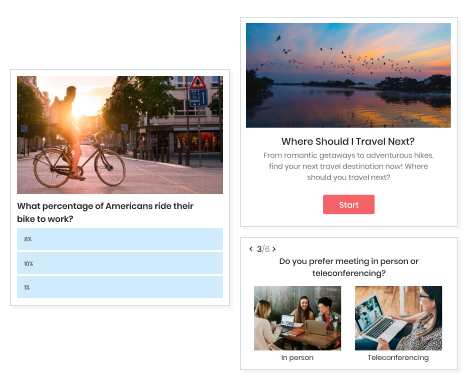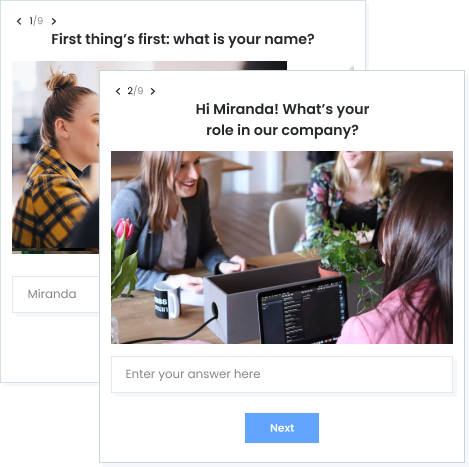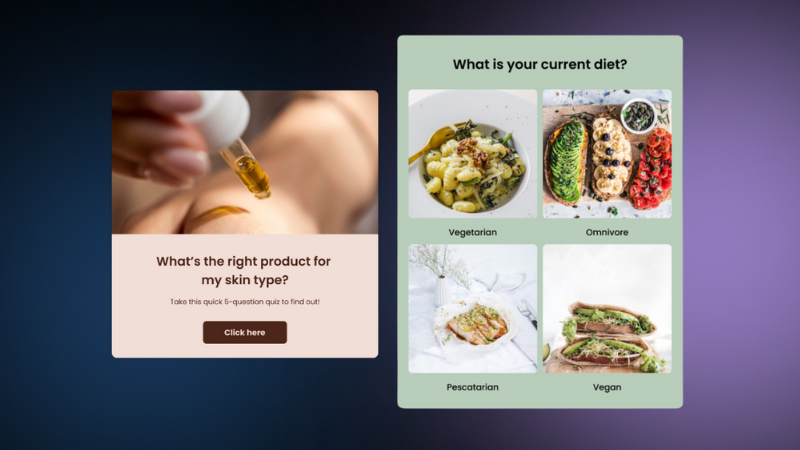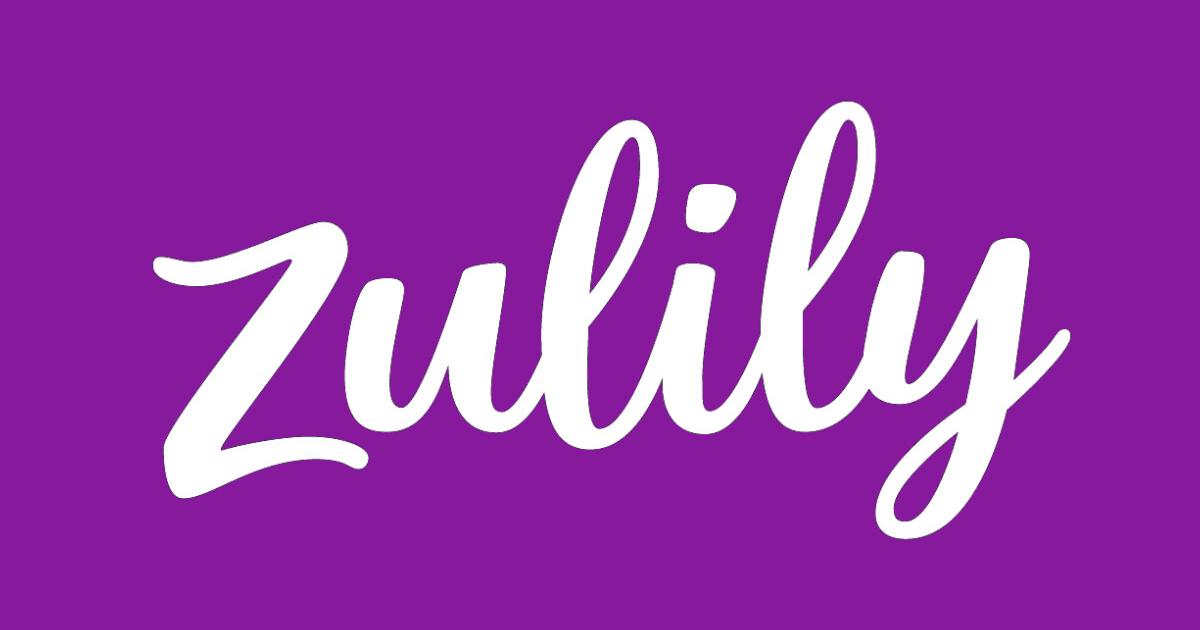Top 25 Personality Questions for Every Scenario
Ever wondered what makes people tick and how you can use it to your advantage? Our top 25 personality questions will help you learn everything about a person, from communication styles to conflict resolution. With this knowledge, you’ll be able to adjust your strategies, improve relationships, and make better-informed decisions.
Let’s Get Started
- Why You Need to Use Personality Tests
- Types of Personality Tests
- Three Types of Personality Questions Every Test Needs
- Top 25 Personality Questions for Every Scenario
- 10 Do’s and Don’ts for Writing Effective Personality Questions
Why You Need to Use Personality Tests
Whether you’re a marketer looking to attract a wider audience, a hiring manager seeking new ways to assess candidates, or a business owner striving to optimize operations, personality tests are a must-have for your toolkit of success.
For Marketers
In marketing, personality tests are more than just for fun – they’re powerful tools that give you a sneak peek into how your customers think and what they prefer.
Here’s how they can help supercharge your marketing strategies for better engagement and results:
- Use the results from your personality test to tailor your brand messages and ad campaigns. This will help boost brand awareness, engagement, and conversions.
- Make your personality test go viral by creating eye-catching content that people want to share. You can also partner up with influencers, incorporate popular social media challenges, and offer prizes for participation.
For Hiring Managers
If you work in human resources, you can use personality tests during the hiring process for a deeper understanding of a candidate’s potential beyond their qualifications. This helps you assess if they align with your team dynamics and company culture.
You can also use personality tests during a job interview to help you:
- Gain a deeper understanding of a job candidate’s potential beyond their qualifications, specifically in a professional setting.
- Assess if a candidate is a team player or if they prefer working independently.
- Check if candidates flourish in roles that align with their personalities and strengths.
- Find out if candidates possess good social skills, problem-solving skills, and if they can handle stressful situations.
Tip: Before you create a personality test for a job position, identify the specific traits or characteristics that are essential for success in the role. Use personality interview questions that align with these traits, and during the interview, encourage candidates to share real-life examples from their past experiences that demonstrate these traits in action.
This approach allows you to gain valuable insights into how a candidate’s personality aligns with the demands and expectations of the job, helping you make a more informed hiring decision.
For Business Owners
When it comes to running a business, personality tests provide you with valuable insights to optimize your teams, improve customer service, and refine your communication and leadership strategies.
- Learn about your team members’ strengths, working styles, hard and soft skills, and areas for improvement. Use the test results to plan future team-building days, promoting better collaboration and synergy in your organization.
- Understand your customers’ preferences by using personality tests, and adjust your services accordingly. This will help you tailor your offerings to meet their unique needs and preferences, leading to higher satisfaction and loyalty.
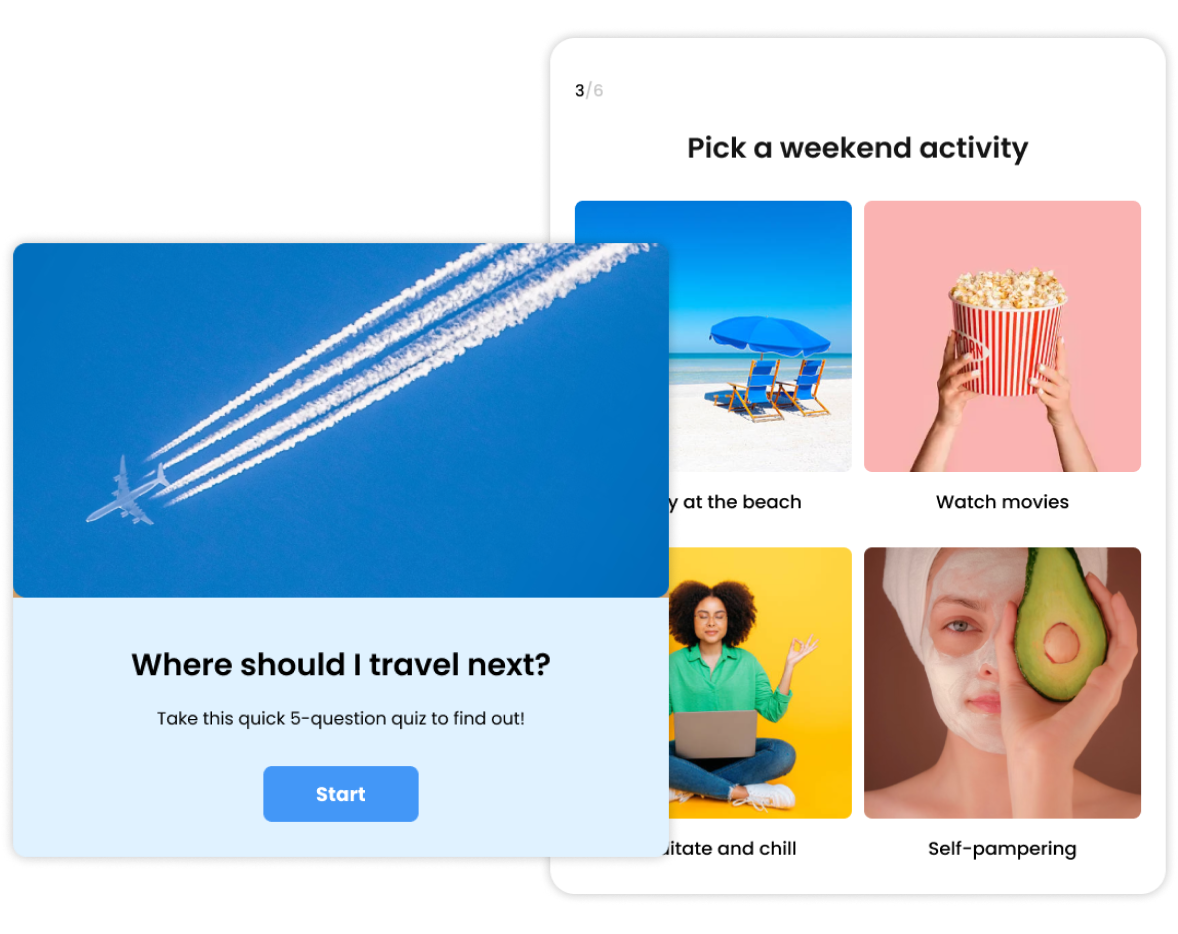
Types of Personality Tests
There are five main types of personality tests, each with its unique approach to personality questions:
- The Myer-Briggs Type Indicator (MBTI)
- Kolbe Test
- DISC Assessment
- Process Communication Model
- The Personality Assessment System
Although these tests are effective, they might not be an exact match for what you’re trying to achieve. Instead, you can use statement-based, close-ended, and open-ended personality questions. They’re easier to work with compared to the other personality tests that can get a bit complex.
You can read more about these question types below.

Three Types of Personality Questions Every Test Needs
To gain a thorough understanding of someone’s character through a personality test, it’s important to understand the different question types and how to use each one effectively.
Statement-based Personality Questions
With this type of personality test question, you offer a statement, such as ‘I enjoy working closely with others’. The answers are typically measured on a 5 or 10-degree scale, with ‘strongly disagree’ at the bottom and ‘strongly agree’ at the top. Even though these questions are effective for collecting data, they don’t dig too deep into the respondent’s personality.
Close-ended Personality Questions
Close-ended questions require you to provide the respondent with several answers. For example, you could ask a question such as: ‘What do you do if you don’t understand a project assigned by your supervisor?’ Answers could include: Review my notes and hope for the best, ask the supervisor for clarification, ask colleagues for help, or request an extended deadline.
Open-ended Personality Questions
These questions are typically used during the interview process, as they allow the interviewee to provide a detailed answer. Open-ended questions can tell you a lot about a person’s personality, but only if you ask the right ones.
Ready to create your own personality quiz?
Top 25 Personality Questions for Every Scenario
There is no right or wrong way to conduct a personality test, as it’s based largely on your purpose, the respondent, and what you’re trying to accomplish.
While it’s important to customize your personality test to match your specifications, these 25 questions are a good place to start:
1. What do you consider your greatest achievement in life?
This tells you how a person perceives success. Maybe their greatest achievement is a professional award. Or maybe their greatest achievement is raising three children who went on to earn a college degree. The answer will give you a better understanding of how the person prioritizes their life.
2. What steps do you take to remain calm under pressure?
This is an important question if you’re hiring for a job in a fast-moving, high-pressure environment. You can turn this into a close-ended personality question with answers such as:
- Ask for help
- Take a break
- Review the tasks at hand
- Cry
3. What do you enjoy doing in your spare time?
What a person does outside of work gives you insight into who they are. Some people enjoy watching television. Others enjoy spending time outdoors. Some have no personal interests at all.
4. What is your favorite vacation destination?
It’s an innocent question with no right or wrong answer, but it does provide a better understanding of what the person enjoys. You can frame this as a close-ended question with answers such as:
- Beach
- Mountains
- Cross-country road trip
- Camping
5. What is the greatest injustice you’ve personally experienced?
This is an important question when determining if the interviewee is a good cultural fit for your company. It provides insights into their view of the world, attitudes, past experiences, and boundaries as an individual.
6. What is the biggest challenge you’ve faced?
Everyone faces challenges from time to time. Understanding a person’s biggest challenge will show you how they deal with adversity. It also helps you determine if the person is able to take on the demands of your job.
For example, one person may answer that their biggest challenge was overcoming the death of a loved one. Another person may answer that their biggest challenge was finding the right outfit to wear to a job interview. These answers are on opposite ends of the spectrum.
7. If you face a problem at work, what is the first thing you do?
Asking this question, and providing several answers, provides a true overview of how a person will react if they face a problem at work. Answers could include:
- Ask for help
- Delegate the task to someone else
- Research potential solutions
- Make excuses
8. If you could only change one thing about yourself, what would it be?
This is an intriguing question because it’s another way of asking a person about their greatest flaw. There’s no right or wrong answer, but the feedback you receive can be useful in helping you understand how the person thinks and whether they have confidence in themselves.
9. What is the question people ask you most often?
This is one of the most powerful questions you can ask, as it shows you what others think of the person.
Is the person often asked for advice? Is the person often asked why they jump to conclusions?
When someone is always asked for advice, it probably means they’re helpful. When someone is always asked why they jump to conclusions, it could be a red flag that they’re not a good team player.
10. What is your best memory from your childhood?
Is it a vacation they took with their family? Is it an achievement in elementary school, such as winning a science fair? The answer gives you insight into an experience that turned the person into who they are today.
11. What is your worst memory from your childhood?
If you’re going to ask about a person’s best memory from childhood, follow-up with this question. Once again, the answer will give you a better understanding of who the person is. For example, if their worst memory was the divorce of their parents, it’ll show you that the person is resilient.
12. Do you find it easy to make new friends?
Some people find it easy to make new friends, which allows them to fit in comfortably in almost any setting.
Conversely, others find it difficult to make new friends, thus putting them at a disadvantage in social situations or when starting a new job.
13. Do you sympathize with people who are going through a tough time?
A person who can sympathize with others is a person you want on your team. These people aren’t only concerned about themselves but truly care about the well-being of others. Most people who answer “yes” are team players.
14. Do you tackle tasks right away or procrastinate until the last minute?
When interviewing job candidates, the answer to this question will give you a better idea of the person’s work ethic and how they tackle difficult tasks. You want someone on your team who is willing to “dive right in” as opposed to waiting until the last minute.
15. What was your favorite game when you were a child?
Did they enjoy playing football with friends? What about tag? How about hide-and-seek? Or did they prefer playing alone?
This will tell you more than a direct question that typically prompts a person to provide an “appropriate” answer. When used as a close-ended personality question, potential answers include:
- Hide-and-seek
- Sports
- Board games
- Puzzles
- Playing alone
16. If asked, what would your friends and family say about you?
This is another way of asking “How would your friends and family describe you?”
This reveals how others perceive the person. Ask it as a close-ended question with answers such as:
- Kind
- Smart
- Caring
- Quiet
17. What is your best trait?
This is similar to question #16, so it makes sense to ask them back-to-back. The answer gives you a clear idea of what a person thinks of themselves.
One person may say their best trait is helping others in times of need. Another person may say their best trait is their good looks. Who would you rather have working by your side?
18. What is your greatest failure?
Many people find it difficult to pinpoint and share their greatest failure, so asking this question will force them to dig deep. The answer gives you insight into the person’s past, the mistakes they’ve made, and the way they dealt with them.
19. How did you turn your greatest failure into a learning experience?
This question should be asked after #18, as it gives the person the opportunity to explain how they turned the failure into a positive experience.
20. Who is your role model?
Understanding a person’s motives and priorities is essential to understanding who they are. If framed as a close-ended question, potential answers include:
- Family member
- Friend
- Co-worker or supervisor
- A famous person in history
21. What was the happiest period of your life?
Use this question to reveal how a person measures happiness, their priorities in life, and events that molded them into who they are today.
22. What was the saddest period of your life?
A potential follow-up question to #21, the answer helps you see how the person has overcome a difficult period in their life.
23. Would you rather read a book or watch television?
Are you interested in better understanding how a person gathers information? Do you want to learn how they prefer to communicate with others? This question can help.
A person who would rather read a book is more likely to learn visually, such as by reading a set of instructions. People who prefer to watch television may also be visual, but they’re more likely to be open to learning through conversation.
24. Who knows you best?
It’s important to understand if a person has strong personal relationships. If their mother and father know them best, they may be an introvert. But if a friend or co-worker knows them best, they probably excel in making friends and getting along with others.
25. What is one thing you would never say to another person?
This reveals a person’s personal boundaries. Offer answers such as:
- Something about their personal life
- Comment about their physical appearance
- Something about their choice of clothing or style
- Any statement with a curse word
10 Do’s and Don’ts for Writing Effective Personality Questions
Well-written questions can give you deeper insights into someone’s true character and personality. Keep reading to learn about our top tips for writing effective personality questions, while steering clear of common mistakes.
1. Tailor Questions to Traits
Make sure your personality quiz’s questions directly target the specific personality traits you’re assessing. This ensures accurate insights into the individual’s character and behavior.
For example, during the hiring process, understanding a candidate’s personality type can help determine whether they would thrive in a role that emphasizes teamwork and collaboration or if they would be better suited for a more independent position.
Avoid: Generic or ambiguous questions
Steer clear of vague questions that could be interpreted in multiple ways. Clarity is key for precise personality assessment.
For example, instead of asking, “Are you a team player?” which might receive a generic response, you could ask, “Describe a specific situation where you had to collaborate with a team to achieve a common goal.”
2. Maintain Neutrality and Unbiased Tone
Write unbiased questions that encourage genuine and unfiltered answers. Although there are no wrong answers, it’s important to avoid leading or loaded questions.
Avoid: Leading or Loaded Questions
Avoid phrasing that guides respondents toward a particular answer. It can skew results and misrepresent their true personality.
3. Test for Consistency and Reliability
Include similar questions in different parts of the assessment to ensure the respondent’s answers align consistently, validating the results.
Avoid: Redundant or repetitive questions
Repeating the same questions in various ways can be bothersome for respondents. It’s better to keep it simple and avoid annoying them, which could affect the accuracy of the answers to personality questions.
4. Incorporate Diverse Question Types
Mix multiple-choice, open-ended, and scaled questions for a comprehensive view of the respondent’s personality, allowing for varied responses.
You can also add smart logic to your personality quiz, which shifts the experience from a robotic questionnaire to an engaging dialogue, giving your quiz respondents a sense of being truly heard and valued.
- Skip logic can take your respondents down a question path that’s relevant to them. You can use Opinion Stage’s personality quiz maker to easily define which question your respondents will see next based on their answer to the previous one.
- Answer piping gives an extra personal touch. It allows you to use your respondent’s answer to one question in another question. For example, if you ask a respondent their name, the next question will have their name filled in automatically.
Avoid: Exclusively closed-ended questions
Using only yes/no or one-word answer questions limits how much you can find out and you might miss the finer details of someone’s personality.
5. Use Clear Language and Simple Phrasing
Make sure the language you’re using in your personality quiz is straightforward and easy to understand.
Avoid: Complicated or confusing wording
Steer clear of confusing language that may result in respondents misinterpreting the questions and providing inaccurate responses.
For example, instead of asking, “In what way do you tend to synergize with your team?”, simply ask, “How do you usually work with your team to achieve goals?”
6. Include a Mix of Positive and Negative Questions
Balance questions by phrasing some positively and others negatively. This deters respondents from falling into a predictable pattern of answers.
Avoid: Exclusively positive or negative tone of voice
Avoid framing all questions in the same tone, as it might lead to biased responses.
For example, instead of asking, “Do you think procrastination is always a bad habit?” you can ask, “How do you manage your time effectively to avoid delays in tasks?”
7. Use Questions That Align With Your Goal
Double-check that the questions in your personality assessment relate to what you want to find out. The questions should match why you’re doing this assessment and the situation you’re focusing on.
Avoid: Out-of-context or irrelevant questions
Steer clear of including questions that are not connected to the main goal or aim of the personality assessment. Irrelevant questions can distort the overall interpretation of the personality traits you’re trying to assess.
8. Test Questions Internally for Bias
Pilot-test your questions with a diverse group to identify any potential biases based on age, gender, cultural background, etc., and make necessary adjustments.
Avoid: Overlooking diversity in testing
Skipping testing with a diverse group can keep biases ingrained in the questions, which might result in skewed personality profiles.
9. Encourage Genuine Self-Reflection
Add some thought-provoking questions that make respondents pause and reflect on their actions and thoughts. It’s like peeling back the layers to better understand themselves.
Avoid: Superficial or judgmental questions
Avoid questions that are overly critical or don’t prompt genuine self-reflection, as they can lead to inaccurate personality assessments.
For example, instead of asking, “Do you ever make foolish decisions?” you could ask, “Describe a challenging decision you’ve faced and how you approached it.”
10. Keep the Assessment Time-Appropriate
Make sure the assessment doesn’t take too long—aim for a reasonable duration. This way, people stay engaged and provide more accurate and focused responses.
Avoid: Long personality tests and rushed questions
Don’t overload the personality quiz with a lot of questions, as it can lead to respondent fatigue. Avoid writing hurried and thoughtless questions – they might not accurately capture the important details of a person’s personality.
Ready to create your own personality quiz?

